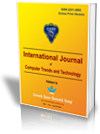How to Cite?
Salih H. Babiker, Izzeldin A. Elhassan, "Business Intelligence Implementation in Healthcare - A Case Study in Sudan," International Journal of Computer Trends and Technology, vol. 68, no. 12, pp. 4-10, 2020. Crossref, 10.14445/22312803/IJCTT-V68I12P102
Abstract
There are many universal challenges facing healthcare worldwide, including rising costs, the numerous stakeholders, their complex interrelationships, varying interests, and volumes of highly sensitive and regulated data. Business Intelligence (BI) technologies offer tools and techniques for streamlining operations and supporting decision-making based on real information. This research investigates the value and advantage of adopting BI technologies to enhance the healthcare sector. It proposes a BI framework that enables analyzing data, supporting decision-making, predictions, and achieving overall improvements in the sector`s diverse facets. A mix of research methods was used to validate the framework, including content analysis to identify the main characteristics of healthcare services and factors affecting BI adoption`s success, along with a case study implementation of the proposed BI solution. Data was collected from three major healthcare providers in Sudan. Key stakeholders` interviews served to identify the main features to examine based on their corresponding Hospital Management Systems (HMSs). The study focuses on three groups of identified factors, namely provider, service, and time management. Analysis of results from the implemented BI model supports the research hypothesis that utilizing BI yields reliable consolidated information, knowledge-based decisions, improved processes, and improved healthcare services.
Keywords
Business Intelligence, Healthcare, Data Warehouse, Data analysis, Decision-making.
Reference
[1] Boonsiritomachai, W, M McGrath, and S Burgess. A research framework for the adoption of Business Intelligence by Small and Medium-sized enterprises. in Small Enterprise Association of Australia and New Zealand 27th Annual Seaanz Conference. 2014.
[2] Palanisamy, Venketesh and Ramkumar Thirunavukarasu, Implications of Big Data Analytics in developing Healthcare Frameworks–A review. Journal of King Saud University-Computer and Information Sciences, 2017.
[3] Salih H. Babiker, Izzeldin A. Elhassan, Review of Business Intelligence Implementation in Healthcare. International Journal of Computer Trends and Technology (IJCTT), 687(7) 2020.
[4] Moore, Kalie, Business Intelligence in Healthcare: Saving Lives and Cutting Costs. http://www.datapine.com/blog/business-intelligence-in-healthcare/, 2014: p. 5.
[5] Blomberg, Jeanette and Helena Karasti, Reflections on 25 Years of Ethnography in CSCW. Computer Supported Cooperative Work (CSCW), 2013. 22(4-6): p. 373-423.
[6] Hübner, Ursula, Elske Ammenwerth, Daniel Flemming, Christine Schaubmayr, and Björn Sellemann, IT adoption of clinical information systems in Austrian and German hospitals: results of a comparative survey with a focus on nursing. BMC Medical Informatics and Decision Making. 10(1) (2010) 8.
[7] Gaardboe, Rikke, and TANJA SVARRE, BUSINESS INTELLIGENCE SUCCESS FACTORS: A LITERATURE. Journal of Information Technology Management,. 29(1) (2018) 1.
[8] Gaardboe, Rikke, Tom Nyvang, and Niels Sandalgaard, Business intelligence success applied to healthcare information systems. Procedia Computer Science,. 121 (2017) 483-490.
[9] LouranZ, AhmedMudawi Musa, Promoting access to high-quality primary health care services in Sudan Data retrieved from the Central Bureau of Statistics website. Available from: www.who.int/evidence/PHCPolicyBriefSudan2012.pd/. 2012.
[10] Al Omoush, Khaled Saleh, Raed M Alqirem, and Sabri R Alzboon. The Role of Business Intelligence Tools in Harvesting Collective Intelligence. in International Conference on Information Systems Architecture and Technology. 2018.
[11] Khedr, Ayman, Sherif Kholeif, and Fifi Saad, An Integrated Business Intelligence Framework for Healthcare Analytics. International Journal, 2017. 7(5).
[12] Ahmed, Soha, Ahmed Ibrahim El Seddawy and Mona Nasr, A Proposed Framework for Detecting and Predicting Diseases through Business Intelligence Applications. International Journal of Advanced Networking and Applications, 2019. 10(4): p. 3951-3957.
[13] Davidson, MD and J Arthur, Creating Value: Unifying Silos into Public Health Business Intelligence. eGEMs (Generating Evidence & Methods to improve patient outcomes), 2015. 2(4): p. 8.
[14] Pereira, Ana, Filipe Portela, Manuel Filipe Santos, José Machado and António Abelha, Pervasive business intelligence: a new trend in critical healthcare. Procedia Computer Science, 2016. 98: p. 362-367.
[15] JINPON, Puangrat JAROENSUTASINEE, Mullica JAROENSUTASINEE, Krisanadej, Business intelligence, and its applications in the public healthcare system. Walailak Journal of Science and Technology (WJST), 2011. 8(2): p. 97-110.
[16] George, Joseph, V Kumar, and S Kumar. Data warehouse design considerations for a healthcare business intelligence system. in World congress on engineering. 2015.
[17] Ashrafi, Noushin, Lori Kelleher, and Jean-Pierre Kuilboer, The Impact of Business Intelligence on Healthcare Delivery in the USA. Interdisciplinary Journal of Information, Knowledge, and Management, 2014. 9.
[18] Mwilu, Odette Sangupamba, Isabelle Comyn-Wattiau, and Nicolas Prat, Design science research contribution to business intelligence in the cloud—A systematic literature review. Future Generation Computer Systems, 2016. 63: p. 108-122.
[19] Microsoft.com, Microsoft SQL Server BI tools. https://www.microsoft.com/en-us/sql-server/sql-business-intelligence, 2020: p. https://www.microsoft.com/en-us/sql-server/sql-business-intelligence.


